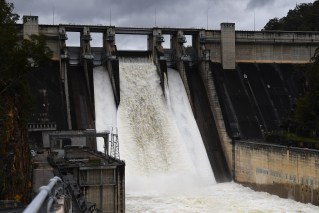UN chief Antonio Guterres has declared the dawn of the “era of global boiling” as July looked set to become the hottest month on record.
With just days to go, July is poised to upend all previous global heat benchmarks.
And it has been a devastating month in which wildfires have raged in Greece and temperatures soared into the high 40s in Europe, China and the US.
The UN World Meteorological Organisation and European Union’s Copernicus Climate Change Service said in a joint statement it was “extremely likely” July 2023 would break the record.
But Mr Guterres said we “don’t have to wait for the end of the month to know this”.
“Short of a mini-ice age over the next days, July 2023 will shatter records across the board,” he said in New York.
Mr Guterres said July had already brought the hottest three-week period recorded; the three hottest days on record; and the highest-yet ocean temperatures for this time of year.
He said the dire impacts had been predicted, and the only surprise was “the speed of the change”.
“Climate change is here. It is terrifying. And it is just the beginning,” the UN secretary general said.
“The era of global warming has ended; the era of global boiling has arrived.
“The air is unbreathable. The heat is unbearable. And the level of fossil fuel profits and climate inaction is unacceptable.”
The effects of July’s heat have been seen across the world.
Thousands of tourists fled wildfires on the Greek island of Rhodes and many more suffered baking heat across the US south-west.
Temperatures in a north-west China township soared as high as 52.2 degrees, breaking a record in the country.

People in China try to cool off as a heatwave makes life unbearable. Photo: Getty
While the WMO would not call the record outright, instead waiting until the availability of all finalised data in August, an analysis by Germany’s Leipzig University concluded that July 2023 would clinch the record.
This month’s mean global temperature is projected to be at least 0.2 degrees warmer than July 2019, the former hottest in the 174-year observational record, according to EU data.
The margin of difference between now and July 2019 is “so substantial that we can already say with absolute certainty that it is going to be the warmest July”, Leipzig climate scientist Karsten Haustein said.
July 2023 is estimated to be roughly 1.5 degrees above the pre-industrial mean.
The WMO has confirmed that the first three weeks of July have been the warmest on record.
Commenting on the pattern, Michael Mann, a climate scientist at the University of Pennsylvania, said it was clear by mid-July that it was going to be a record warm month, and provided an “indicator of a planet that will continue to warm as long as we burn fossil fuels”.
Normally, the global mean temperature for July is about 16 degrees, inclusive of the southern hemisphere winter.
But this July it has surged to about 17 degrees.
What’s more, “we may have to go back thousands if not tens of thousands of years to find similarly warm conditions on our planet,” Mr Haustein said.
Early, less fine-tuned climate records – gathered from things like ice cores and tree rings – suggest the Earth has not been this hot in 120,000 years.
Mr Haustein’s analysis is based on preliminary temperature data and weather models, including forecast temperatures through the end of this month, but validated by unaffiliated scientists.
“The result is confirmed by several independent datasets combining measurements in the ocean and over land. It is statistically robust,” said Piers Forster, a climate scientist at Leeds University.
Canadian wildfires burned at an unprecedented pace while France, Spain, Germany and Poland sizzled under a major heatwave, with the mercury climbing into the mid-40s on the Italian island of Sicily, part of which is engulfed in flames.
Marine heatwaves have unfolded along coastlines from the United States to Australia, raising concerns about coral reef die-off.
Meanwhile, record rainfall and floods have deluged South Korea, Japan, India and Pakistan.
The planet is in the early stages of an El Nino event, borne of unusually warm waters in the eastern Pacific.
El Nino typically delivers warmer temperatures around the world, doubling down on the warming driven by human-caused climate change, which scientists said this week had played an “absolutely overwhelming” role in July’s extreme heatwaves.
While El Nino’s effects are expected to peak later this year and into 2024, it “has already started to help boost the temperatures,” Mr Haustein said.
July is traditionally the hottest month of the year, and the EU said it did not project August would surpass the record set this month.








